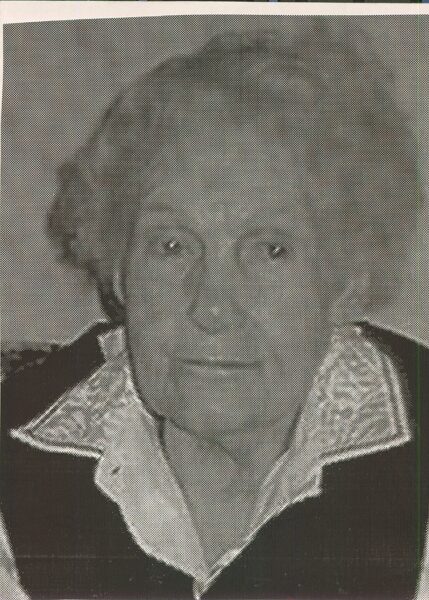
At the business college her duties included finding placements for the students. When the request came for a secretary at he Regna Leader Post, she told her boss she was interested in trying for the job. It proved a good choice. The editor she was to work for was accustomed to doing his own calls and writing his own letters, She told him what she was really intersted in writing, but really did not know where to start and doubted that she knew enough. He told her to write 200 words on anything she liked, and he would look at it. She worked hard at that story, wrote it eight times and finally gave it to her editor.
From then on she could write stories not exceeding 200 words, and evenually she made it to the front page. ÈOne never forgets the ront page, she says, and getting a byline was readon to give a party.
She worked six years, but at that time made 20 less that what she started wtih. Times were tough. Canada had 1 million unemployed out of 10 million people. There was a labour war, and they asked themselves why so many people were out of work. Thet got together, talked about fascism, socialism. Everybody seemed scared of Europe. What were they talking about. None of them had ever been over to see what was going on. They heard that the Russions had no unemployment, but did not know that they were forced to work. In the spring of 1935 Arnold bought a new suit and a rain cape. A friend gave her a whole dress she had knitted. With her savings she set off for Europe. The CWPC branch in Winnipeg organized a luncheon for her and gave her a small suitcase filled with tomato and apple juice. Everybody had heard that you needed to prepare well to go to sea, so you would not end up getting scurvy.
As a journalist her help was often sought for keeping records. She had a typewriter and the skills needed for such tasks.
Prepared to tough it out i a foreign country, studying and sending out articles to Canadian Press
Reason to go to Paris. They had get togethers discussing what went on in Europe. They heard about fascism and nazism and tried to make sense out of it, until Arnold decided that the only way to find out was to go there.
She made an arrangement with the treasurer of the paper that he would withhold 50% of her salary, so she could save the amount neeeded to go overseas. He made it hard on her and thus helped her to achieve her goal
Her experiences during the war are marvelously recounted in her book One Womanès War, published in 1987 by James Lorimer and Company.
From Regina to Paris . Quit her job at Canadian Press to
work for the Free French. (Age 38)
Bought typewriter in 1941, which she used for 25 years (until 1966 approximately. Has lived on Duffering Road for 20 years (presumably since 1977). Her book appeard in 1988.
Prairie girl
Very involved in the warto
There were three choices for women. You could become a nurse, a teacher or a secretary. The first two were safe choices. Teaching at a business college was a good choice, which eventually let into he interesting career as a journalist, spanning from the depression years through the second world war and its aftermath.
She acknwledges she had a great training at the Sifton Papers. Her editor gave her encouragement and opportunity, and the paper sent her to Winnipeg for further training. She did at all times what it took to get her where she wanted to be.
Travel was her great joy and one that certainly lured her into becoming a journalist. Meeting interesting people was another.CPR and CN passes allowed her to travel widely.
With her keen eye she observed and transformed her experience in compelling stories. Forever looking at the reasons and the ramifications, she brought to light many aspects of the war and its aftermath.
The richness of her experiences led her to undertake the writing her book, One Woman’s War, in which in her compelling prose she recounts the many aspects of the second world war and her experiences as a journalist and reporter for the Free French.
Her determination to fully comprehend the events of the time brought her in contact with many great personalities. Her great friendships linked across the continents. She was also a good negotiator, which helped her in many a predicament during the tense times of the war in occupied territory. Not only was she a good observer, she was able to convey the impact her experiences had on her and on the masses who were dislocated because of the war: those who fled the German invaders en masse, and later those who returned from the war zones and concentration camps.
After the war she continued her observations of the aftermath, and voiced her concern about the evil of violence as a means to settle disputes and differenct viewpoints. She urges\d young journalists to pay attention to history.
If you were to become a secretary, it was important to make the right choice in Regina.
Yet she felt she did not know enough to write
Arnold was responsible for the placement of students at a business college. When an opportuity came open that interested her, she discussed it with herboss and told him she was interested in the job herself.
She was to become the secretary of an editor at the Regina Leader Post. He editor, who was happy to write his own letters and handle his own telephone calls, showed her a drawer with files that needed to be dealt with. It was a great way of getting familiar with the job.
She told him that she was interested in writing. Since high school she had read the paper with interest, especially when there were stories of dignataries who crossed the country and stopped over in Regina. Her editor told her to write a story of 200 words.
Luck would have it that she travelled on the first trouist train to Fort Churchil, from where she would sail to ———. The parlour car was made into a dance hall and there was a four piece band to provide entertainment. Fort Churchill did not have a hotel, so arrangements were made for Arold to stay at a doctor’s house while awaiting the arrivel of the ship. The house was part living quarters, part hospital. As the hospital was empty, she got to stay in the hospital part of the house. Her arrival on theship caused consternatioin, especially since she had no companion. The Normandy sailors considered a woman on board bad luck. She stayed in Paris for five years until the threat of war prompted her to go back to Canada for a visit to see her mother.
Travelling had always appealed to her and was no small incentive to become a journalist. Moreover both CPP and CN allowed the paper’s discounts on yearly passes. She had travelled widely in Canada and the United States before setting off to Europe.Travelling is a means to broaden your horizons, she says.
After her visit, travel from Canada to Europe was no longer possible, but travel to the Unived States was permitted. thus she travelled to New York, and since she had a ticket, she could sail from New York to Europe.
Back in Paris she continued sending her stories to the Sifton Papers and to Canadian Press. There were g reat movements of women and children through France She also covered stories on the effect of the war on the civilian population and how civilians were involved in supporting the war effort. She visited the food factories. She stayed some time in London and was asked by Canadian Press to cover the story of the English children that were sent over to Canada so they would be safe. Canadian Press gave her the story because she was the only pnewho could speak French, as she was determined to speak French and anxious to do the job. Had she known that she would not be able to return to Europe she would have declined,
